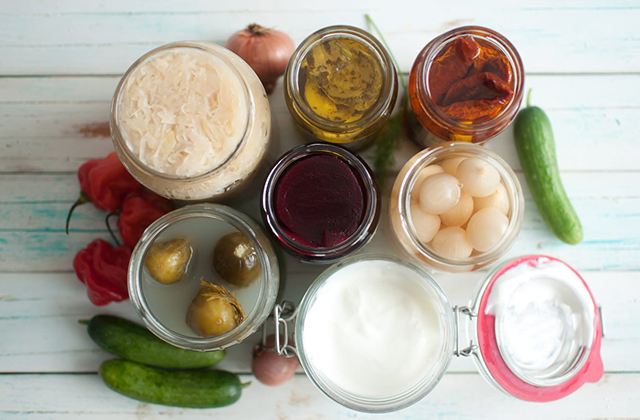Eat a wide range of plant-based foods to improve your gut health. The first antibiotic, Penicillin, was discovered in 1928 by a Scottish biologist named Sir Alexander Fleming while he was experimenting on influenza virus. He found that a common fungus, Penicillium notatum, can control the growth or kill certain kinds of bacteria. He named this newly discovered substance Penicillin, which successfully treated some deadly bacterial infections like syphilis, gangrene, and tuberculosis.
These days, most antibiotics are synthetic though they are usually chemically related to natural antibiotics. Antibiotics are of great value because they combat infections, save millions of lives, and are not harmful to normal body cells. However, they have their drawbacks as they kill healthy gut bacteria and may have side effects such as stomach upset, nausea, diarrhea, and yeast infection.
When penicillin and other antibiotics were first introduced, they were perceived as wonder drugs because they worked quickly and seemed like an answer to all common illnesses. Unfortunately, decades of overuse have resulted in more and more drug-resistant germs – any bacterium that survives an antibiotic treatment can then multiply and pass on its resistant properties to other bacteria.
- Although antibiotics can only treat bacterial infections, they have often been misused for viral infections as well (for example cold, flu, bronchitis, most coughs and sore throats, some ear and sinus infections, and stomach flu).
- Antibiotics are commonly sprayed on fruits and vegetables and given to animals like cattle, chicken, and pigs. As a result, humans are consuming minute doses of antibiotics every day. The cumulative effect on healthy gut bacteria cannot be underestimated.
Antibiotics kill beneficial gut bacteria. Even a single round of antibiotics causes havoc to our gut health.
First, antibiotics cause leaky gut or intestinal permeability, because they so viciously inflame the intestinal lining resulting in the widening of spaces between cells. Normally, the food that we eat is broken down into tiny molecules before they are being absorbed. When we have leaky gut, large molecules of food get through the gut lining into the bloodstream. This triggers the immune system to react, makes antibodies against that food, and result in a food allergy.
Second, antibiotics decimate the population and diversity of good bacteria in the gut. Since 80% of our immune system is in the gut, these good bacteria are our major defense system against all sorts of illnesses. Not only is it important to have a preponderance of good bacteria versus bad, diversity of gut bacterial strains is also critical. Antibiotics are known to reduce the number and diversity of the resident bacterial population in the gut.
What do we do if we absolutely have to take antibiotics? Are there ways we can counter the damages caused by antibiotics?
First and foremost, take a quality probiotic supplement as this will immediately help to reseed some of the good bacteria in the gut.
Check to make sure the supplement contains one or more of these bacteria strains that have confirmed health-promoting features:
• Bifidobacterium bifidum
• Bifidobacterium brevis
• Bifidobacterium infantis
• Bifidobacterium longum
• Lactobacillus acidophilus
• Lactobacillus bulgaricus
• Lactobacillus casei
• Lactobacillus paracasei
• Lactobacillus plantarum
• Lactobacillus rhamnosus
• Lactobacillus salivarius
• Streptococcus thermophilus
Choose one with a higher bacteria count by looking at the number of organisms per capsule, expressed in billion CFU’s. Most brand range from 1-50 billion CFUs. In general, the higher the number, the more potent and expensive it is.
Duration
For the first month after antibiotic use, take a probiotic supplement twice a day, morning and evening. Some supplements are to be taken on empty stomach, some with food. Follow instructions on the bottle. For maintenance, take a probiotic supplement every day.
Apart from taking a supplement, the following are five additional dietary tips to help restore gut health:
1. Avoid Inflammatory Foods
With leaky gut, the gut lining is already inflamed, therefore, it makes no sense to continue eating foods that will cause more inflammation. The worst foods are:
- wheat
- dairy
- sugar
- deep fried foods
Duration
Stay away from inflammatory foods during antibiotic use and at least 7-10 days after. Best is to avoid for 2-4 weeks so that the gut lining has a chance to completely heal and rebuild.
2. Stewed Apples
Cut up two washed, unpeeled, organic apples into 1/2-inch pieces. Place in a pot with filtered water up to about one-third of the apples. Add a few raisins and some cinnamon. Bring to a boil and simmer for 8-10 minutes until the skin of the apple becomes shinny. This makes four servings.
The magic with stewed apples is the fiber inside the skin called pectin. When it is cooked, the pectin comes to the surface. It acts as a prebiotic (food that feeds the good bacteria) and helps seal the leaky gut.
Duration
Have the stewed apples twice a day for the first week after antibiotic use. Then reduce to once every few days for the rest of the month.
3. Chicken Bone Broth
For those who are not into cooking or have no time to cook, many health food stores do carry pre-made chicken bone broth. However, homemade bone broth still tastes the best.
Place organic chicken bones in a soup pot. Add vegetables (such as onions and carrots) and herbs (such as thyme, oregano, parsley, and bay leaf). Add 1-2 tablespoons of apple cider vinegar. Fill with filtered water. Bring to a boil and simmer for at least 3-4 hours. Season to taste.
Chicken bones are rich in collagen which acts as a prebiotic (food that feeds the good bacteria) and helps seal the leaky gut.
Duration
Drink a cup of chicken bone broth every day for the first few weeks after antibiotic use. For maintenance, drink on a regular basis.
4. Foods That Make Butyrate In The Gut
Butyrate is a fatty acid naturally found in butter, ghee (clarified butter), raw milk, parmesan cheese, animal fats, and kombucha (fermented tea).
Butyrate is also formed inside our gut when the good bacteria feed on insoluble fiber (bad bacteria do not feed on insoluble fiber.) Insoluble fiber passes through our intestines largely intact because humans do not have the enzymes to digest it (whereas soluble fiber forms a gel when mixed with liquid). Insoluble fiber prevents constipation by retaining water in the stool and making it soft and bulky.
Top insoluble fiber foods include:
- Beans and legumes
- Nuts and seeds such as almonds and flax seeds.
- Vegetables such as turnips, parsnips, okra, green peas, artichokes, asparagus, beets, sweet potato, broccoli, Brussels sprouts, corn, kale, bell peppers, onions, and carrots.
- Fruits such as apple (with skin), pear (with skin), orange, raspberries, strawberries, apricots, mango, prunes, and figs.
(Please note that it is always preferable to buy organic fruits and vegetables as conventional produce is often sprayed with pesticides and antibiotics. However, if organic is not available, it is still preferable to eat non-organic vegetables than not eating vegetables at all.)
Butyrate is crucial to the well-being of our gut because it supports the health and regeneration of cells in the gut lining. In other words, butyrate helps to repair leaky gut. Multiple studies have shown its ability to fight colon cancer – people with higher levels of butyrate in the gut have a lower risk for colon cancer.
Duration
Make sure your daily diet is always rich in insoluble fiber, especially vegetables.
5. Fermented Vegetables
If you are not into making your own fermented vegetables, you can find them in the refrigerator section of many health food stores. Just make sure they have not been pasteurized as all the healthy bacteria will be lost.
Fermented vegetables are very rich in healthy bacteria or probiotics. Each type of vegetable provides a different strain of bacteria. Since diversity of gut bacteria is essential, it is best to eat several types of fermented vegetables, such as sauerkraut, kimchee, fermented beets, and pickled carrots, cucumbers, and onions.
Duration
Eat a forkful of fermented vegetables twice a day for the first few weeks after antibiotic use. For maintenance, eat once a day.
Article Source: https://EzineArticles.com/expert/Carol_Chuang/545843
Article Source: http://EzineArticles.com/9699936



